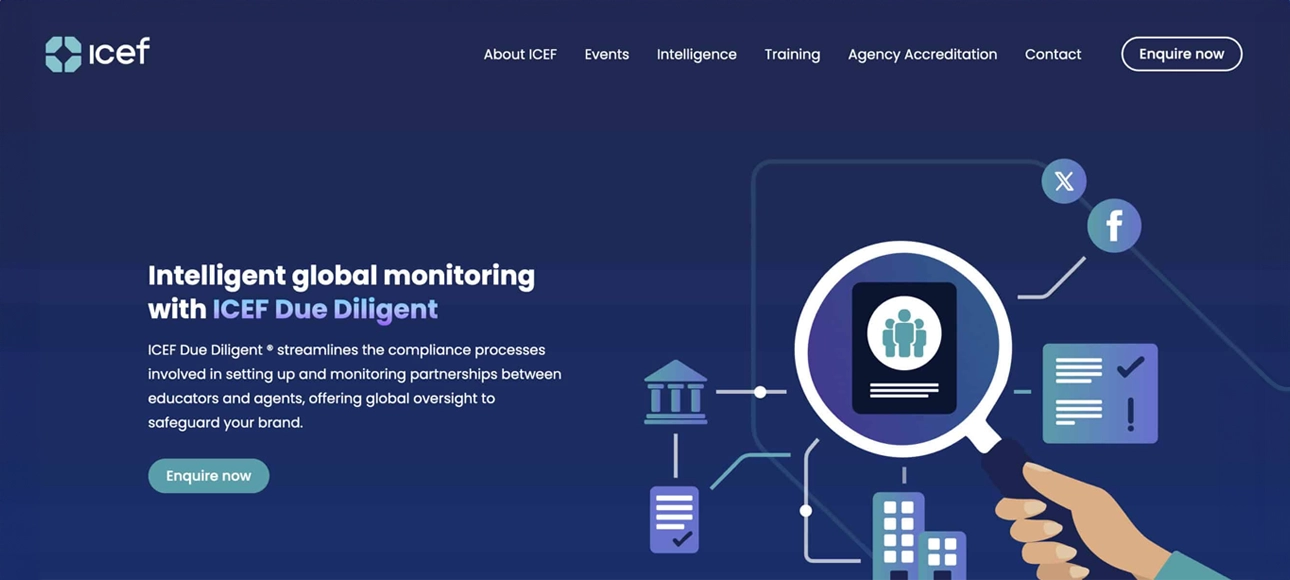Home Office Moves Towards ‘Digital by Default’ English Language Testing
 2 Min Read
2 Min Read
The UK Home Office has taken a major step towards introducing a digital-first approach to English language testing, as part of its ongoing procurement process for the new Home Office English Language Test (HOELT).
In its fifth call for information, the Home Office outlined plans to make “digital by default” the cornerstone of the service. The proposal suggests remote proctoring will become the primary mode of delivery, with physical test centres available only where digital solutions are not practical.
The HOELT, to be delivered in the UK and internationally, is expected to assess candidates across speaking, listening, and, in some cases, reading and writing skills, covering levels A1 to C1 on the Common European Framework of Reference for Languages (CEFR).
The move represents a significant policy shift. Current UK Visas and Immigration (UKVI) rules exclude all digital tests from the list of approved Secure English Language Tests (SELTs). The shift to digital therefore signals a broader government strategy to modernise visa-related testing.
While the Home Office has not confirmed whether the HOELT will be used for university admissions or study visas, previous indications suggest it will primarily serve work and migration visa routes. This leaves questions unanswered for the higher education sector, which has long sought more flexibility in English language testing for international students.
Earlier rounds of consultation examined the capability of the market to deliver secure digital tests, highlighting concerns around global capacity, security, and the reliability of remote proctoring. These issues remain at the forefront of sector discussions as the Home Office pushes forward with its digital-first ambitions.
Suppliers wishing to engage in the consultation must register through the Home Office’s eSourcing Portal. With testing policy at the heart of the UK’s migration system, the outcome of this consultation could have wide-ranging implications for applicants and institutions worldwide.
Source: THE PIE NEWS
Top Stories

ICEF Launches AI-Powered Compliance Platform to Monitor Education Agents
September 8, 2025 | By Daniel
UK Remains Top Choice for Pathway Students Despite Tougher Visa Rules
September 5, 2025 | By Jace
China’s New K Visa Targets Global STEM Talent Amid AI Race
September 4, 2025 | By KaiMore Articles

US Clarifies $100,000 H-1B Visa Fee Rules: Relief for Existing Workers
The United States has issued fresh clarification on the controversial $100,000 H-1B visa fee, easing confusion…
By Kai

Canada’s ‘Edugration’ Model Faces Growing Scrutiny Amid Calls for Reform
Canada’s long-standing “edugration” model; the fusion of education and immigration policy has come under sharp scrutiny as…
By Siya

Universities Urge Swift UK Return to Erasmus Scheme
Universities across the United Kingdom and Europe are urging the government to finalise a deal for the UK’s swift…
By Ezra

Europe’s New Digital Border System: What Indian Travellers Need to Know
Europe is introducing a major digital upgrade to its border control process. Starting 12 October 2025, the…
By Daniel

Record Indian Student Enrolment at USC Despite H-1B Concerns, Says Dean
Despite ongoing visa challenges and new H-1B fees under the Donald Trump administration, the…
By Aahana

South Korea Introduces K-STAR Visa to Attract Global STEM Talent
South Korea has unveiled a new visa pathway designed to attract top global talent in…
By Kai

MIT Rejects Trump’s Preferential Funding Offer, Citing Academic Freedom
The Massachusetts Institute of Technology (MIT) has become the first American university to reject Donald Trump’s proposed…
By Advay

Wales Rejects UK International Student Levy, Reaffirms Commitment to Global Students
Wales has confirmed it will not adopt the UK government’s controversial international student levy, signalling a…
By Vaidant

Lancaster University Expands to India with New Bengaluru Campus
Lancaster University has announced plans to establish a new campus in Bengaluru, India, joining a…
By Henry

International Student Arrivals to the US Drop 19%, India Sees Sharpest Decline
International student arrivals to the United States fell by 19% this August, marking the steepest annual drop…
By Siya

Academic Freedom Shrinks in the US and India, New Report Warns
Academic freedom in the United States and India is facing an alarming decline, according to the Free to Think 2025…
By Vaidant

Starmer Rules Out Visa Changes, Highlights UK University Opportunities in India
UK Prime Minister Keir Starmer has ruled out introducing new visa routes for Indian students and…
By Kai

France Launches Lafayette Fellowship to Attract American Students
France has announced the launch of the Lafayette Fellowship, an exclusive new programme designed to attract top…
By Ezra

Montreal’s Historic YMCA International Language School to Close Amid Policy Turmoil
The YMCA International Language School in Montreal, a fixture in Canada’s language education sector for…
By Daniel

Lawsuit Challenges Trump’s $100,000 H-1B Visa Fee Hike
A coalition of US labour unions, universities, healthcare providers and visa holders has launched the first…
By Advay

US Senator Demands End to OPT Amid Jobs and Espionage Concerns
A senior United States senator has urged the government to halt work authorisations for…
By Jace

Trump’s 15% Cap on International Students Sparks Alarm in US Universities
The United States is bracing for a major shift in higher education as the Donald Trump administration…
By Advay

Lithuania Moves to Tighten Rules on International Students
Lithuania is preparing new restrictions on international students following concerns that some have been…
By Aahana

UCL Granted Extra CAS Numbers After Allocation Exceeded
University College London (UCL) has been granted additional Confirmation of Acceptance for Studies (CAS) allocations…
By Henry

Canada’s PGWP Decline Threatens Workforce Amid Global Talent Shifts
Canada’s labour market is bracing for intensified shortages as post-graduation work permit (PGWP) approvals are…
By Kai

Phased Rollout of New UK BCA Thresholds Confirmed Amid Immigration Crackdown
UK universities have been told to prepare for a “phased implementation” of new Basic Compliance Assessment (BCA)…
By Neerav

UK Overtakes US as Top Destination for Business Education
The United States has lost its long-held crown as the leading destination for business education, with the United Kingdom…
By Henry

Global Demand for US Master’s Degrees Falls by 60% Amid Policy Uncertainty
International student demand for US master’s degrees has plummeted by 61% in 2025, raising concerns about the…
By Vaidant

US Proposes 15% Cap on International Student Enrolments
The United States government has proposed a sweeping new compact that could dramatically reshape international student…
By Aahana

Canada ‘No Longer Competitive’ in Global Talent Race, Warns CBIE
Canada is losing its competitive edge in attracting international students due to a string of federal…
By Daniel

Trump Proposes H-1B Visa Overhaul Favouring Higher Paid Workers
The United States is set for a major shake-up of its H-1B visa programme, with the Trump administration proposing a new…
By Ezra

Report Warns UK International Fee Levy Could Slash Student Enrolments by 77,000
The United Kingdom’s higher education sector could face a severe blow if the government proceeds with plans to…
By Advay

UKVI Reportedly Stops International Students at Airports for Extra Checks
International students travelling to the United Kingdom are reportedly being stopped by UK Visas and Immigration (UKVI) officials…
By Henry

US College Leaders Express Growing Concern Over Trump Administration
Nearly three-quarters of US college leaders have expressed extreme concern over the Trump…
By Ezra

Australia Faces Decline in Student Commencements but 2025 Target Remains Within Reach
Australia’s international education sector has recorded a notable fall in new student…
By Siya

Austria Strengthens Education Ties with India Through STEM Initiatives
Austria has announced a major expansion of its higher education collaboration with India, launching new STEM-focused…
By Ezra

France Strengthens Position as International Student Hub Amid US Decline
France has cemented its position as a leading study destination, hosting nearly 445,000…
By Daniel

Uncertainty Surrounds New $100,000 H-1B Visa Fee in US
Confusion continues to swirl around the United States’ decision to impose a new…
By Neerav

Irish ELT Sector Holds Firm Despite Adult Enrolment Decline
Ireland’s English Language Teaching (ELT) sector welcomed more than 60,000 international students…
By Vaidant

Coventry University Project Wins Study Abroad and Exchange Award
Coventry University’s innovative Telepresence in Theatre project has been named…
By Aahana

Indian Students Reassess Study Abroad Plans After US H-1B Visa Fee Shock
A sudden hike in H-1B visa fees in the United States has unsettled thousands of Indian students and professionals…
By Jace

Scotland Appoints Ben Macpherson as New Higher Education Minister
Scotland has appointed Ben Macpherson, MSP for Edinburgh Northern and Leith, as its new minister for higher…
By Kai

International Students Maintain US Study Plans Despite Concerns, Survey Shows
Despite rising concerns over safety, stability, and visa hurdles, a new survey suggests that most international…
By Ezra

IIE Launches Five-Year Survey on International Higher Education Partnerships
The Institute of International Education (IIE) has launched a five-year global survey examining the landscape of…
By Daniel

Indian Student Loses Court Appeal After Canada Denies PGWP
An Indian student has been denied a Post-Graduation Work Permit (PGWP) in Canada after both Immigration, Refugees…
By Aahana

Germany to Offer Free Student Visas for Indian Short-Term Programmes
Germany has announced a major step to support international education by introducing gratis visas, visas issued free of…
By Kai

United States tops global student satisfaction survey
The United States has retained its position as the world’s leading destination for international student…
By Jace

Saudi Arabia and Australia deepen cooperation in education and research
Saudi Arabia and Australia are forging closer ties in higher education, scientific research, and skills development following…
By Henry

Indian study-abroad sector welcomes GST relief after Supreme Court ruling
India’s study-abroad consultancy sector has expressed relief and optimism following a Supreme Court decision and a subsequent…
By Siya

US visa policy shift raises equity concerns for international students
New guidance from the United States Department of State is sparking widespread concern across the global…
By Aahana

Scotland steps up efforts to retain international students post-graduation
Scotland is intensifying its internationalisation drive, with higher and further education minister Graeme Dey declaring…
By Vaidant

US Institutions Dominate Global MBA Rankings 2026
The United States has reaffirmed its dominance in postgraduate business education, taking…
By Henry

European Universities Urged to Avoid Recruitment Pitfalls of ‘Big Four’
European universities have been warned to avoid the recruitment mistakes made by major study…
By Daniel

Australia Sees Fall in Student Visa Lodgements Amid Integrity Crackdown
Australia’s student visa system is undergoing significant change as application numbers…
By Kai

Hungary Offers Tuition-Free Higher Education with Monthly Stipend
Hungary has announced an attractive opportunity for international students through its flagship Stipendium…
By Neerav

Independent English Language Benchmarking Body ELSA Launches
A new non-profit organisation, the English Language Standard Authority (ELSA), has officially launched with the aim…
By Ezra

Germany Waives Visa Fees for Indian Students in Landmark Move
Germany has announced that Indian students will no longer be required to pay visa fees for short-term academic…
By Advay

Canada Opens PR Pathway for International Education Students
Canada has announced a new immigration pathway that allows international students in education to transition…
By Siya

London Met Tops UK Rankings for Student Value Added
London Metropolitan University has been named the best in the UK for the progress its students make, according…
By Aahana

China Approves 46 New TNE Partnerships in Major Higher Education Expansion
China’s Ministry of Education has approved 46 new transnational education (TNE) partnerships as the country looks…
By Ezra

English Path Expands with New Campus in Riyadh, Saudi Arabia
English Path (EP), a global leader in language training, has announced the opening of a new campus in Riyadh, strengthening…
By Daniel

Global ELT Recovery Stalls as Canada, UK and Australia Face Setbacks
The global English Language Teaching (ELT) sector is facing slower-than-expected recovery, with major study…
By Jace

West Africa Emerges as Growing Study Destination for International Students
West Africa is seeing a surge in international student interest as affordability and visa accessibility drive demand…
By Advay

Australia’s New Tertiary Education Commission to Steer Long-Term Reform
Australia has launched the Australian Tertiary Education Commission (ATEC), a new independent body tasked with driving…
By Neerav

Canada Rejects 80% of Indian Student Visas in 2025 as Germany Gains Ground
Canada has rejected nearly 80% of student visa applications from India this year, marking one…
By Vaidant

Universities of Greenwich and Kent to Merge into ‘Super-University’
Two prominent UK universities, the University of Greenwich and the University of Kent, have announced a merger…
By Kai

UK International Student Numbers Double Over Past Decade
The number of international students in the United Kingdom has more than doubled over the past decade, reinforcing…
By Siya

US Visa Applicants Must Now Interview in Home Country
The US State Department has announced that, effective 6 September 2025, all nonimmigrant visa applicants, including…
By Ezra

Harvard Secures Court Victory Against Trump Administration
Harvard University has won a major legal battle against the Trump administration, with a federal court ruling that the…
By Vaidant

Malvern College to Open New Campus in Saudi Arabia by 2027
UK independent school Malvern College has announced plans to open its first Saudi campus in Riyadh, marking a…
By Jace

Indian Students Face Stricter Visa Rules as US Tightens Policies
Indian students planning to study in the United States are facing tougher challenges after the US government enforced stricter…
By Aahana

USC Launches New Undergraduate Degree in Artificial Intelligence
The University of Southern California (USC) has announced the launch of a new undergraduate programme in Artificial Intelligence, marking a…
By Henry

ICEF Launches AI-Powered Compliance Platform to Monitor Education Agents
ICEF, a leading accreditation and training organisation in the international education sector, has unveiled an…
By Daniel

TOEFL Launches ₹10 Lakh Initiative for Indian Study Abroad Aspirants
Indian students planning to study overseas have been given a fresh boost through a new initiative by ETS, the organisation behind…
By Advay

Germany Surpasses US and Canada as Top Study Destination for Indian Students
Germany has overtaken the United States and Canada as the leading choice for Indian students seeking higher education…
By Henry

UK Remains Top Choice for Pathway Students Despite Tougher Visa Rules
The United Kingdom continues to hold its position as the leading destination for…
By Jace

India and Germany Agree on Gratis Visas to Boost Student Exchanges
India and Germany have agreed to introduce gratis visas for short-term school and college visits, a move aimed at…
By Aahana

China’s New K Visa Targets Global STEM Talent Amid AI Race
The launch of the new K visa is being hailed as a landmark step in China’s bid to secure global technological leadership…
By Kai

US Visa Curbs Fail to Deter Young Ghanaians from Pursuing the American Dream
New visa restrictions imposed by the United States have done little to dampen the ambitions of Ghanaian students…
By Neerav

Indians’ Spending on Foreign Studies Falls to 7-Year Low Amid US Visa Curbs
Indians’ spending on foreign education has slumped to a seven-year low, with tighter visa rules in the United States and…
By Ezra

APPG Calls for Regional Focus on International Students’ Economic Impact
The All-Party Parliamentary Group (APPG) for International Students has urged the government to adopt a comprehensive…
By Henry

International Universities Explore Campuses in Bangladesh
International universities are showing increasing interest in setting up campuses and dual degree programmes…
By Vaidant

Canada Raises Financial Proof Requirement for Study Permits from September 2025
International students applying for study permits in Canada will soon face stricter financial…
By Advay

UK warns international students against overstaying visas
The UK government has begun sending text and email alerts to international students whose…
By Jace

Spain launches fast-track route for US-affected students
Spain has unveiled a new education fast-track to attract international students impacted by…
By Aahana

UK universities boost career support for Indian and Chinese graduates
Two leading UK universities have joined forces to strengthen career prospects for their…
By Siya

British Council vows to continue work in Ukraine after Kyiv strike
The British Council has pledged to continue its mission in Ukraine despite its Kyiv headquarters…
By Daniel

Remittances for Indian Students Abroad Fall to Five-Year Low
Remittances by Indians for studying abroad dropped to a five-year low of USD 138.8 million in…
By Kai

Canada Rejects Nearly Two-Thirds of Study Permit Applications in 2025
Canada’s study permit approval rate has plunged to its lowest in over a decade, with…
By Advay

International Students in the UK Urged to Sharpen Skills for Tougher Job Market
International students in the UK are being encouraged to sharpen their skills, build strong…
By Neerav

US Proposes Four-Year Limit on Student Visas, Sparking Backlash
The United States government has unveiled a controversial proposal to cap student visas…
By Daniel

July Sees Sharp Decline in US Student Visa Arrivals
The United States has recorded a steep fall in international student arrivals this…
By Henry

UK to Host 40 Gazan Students on Funded University Scholarships
The United Kingdom has confirmed plans to welcome around 40 students from Gaza to take up…
By Kai

Trump Backs 600,000 Chinese Students in US Universities
US President Donald Trump has announced plans to allow 600,000 Chinese students…
By Siya

Korea Struggles to Match International Graduates with Employers Despite Record Numbers
South Korea is seeing record growth in its international student population, with more than…
By Ezra

Canada Accepts TOEFL Essentials for Economic Migration
In a significant development for international applicants, Immigration, Refugees and Citizenship…
By Jace

UK Government Opens Applications for Commonwealth Shared Scholarships 2025
Applications are now open for the Commonwealth Shared Scholarships 2025, announced by the…
By Vaidant

Niger East Senator Sends 200 Students Abroad on Landmark Scholarship
In a landmark educational initiative, Senator Mohammed Sani Musa of Niger East has…
By Aahana

OPT programme under threat as US lawmakers push for termination, new taxes, and stricter rules
The United States Optional Practical Training (OPT) programme, a crucial pathway for international…
By Daniel

Trump Administration Slashes $100m in Study Abroad Funding, Sparking Backlash
The United States has announced sweeping cuts to study abroad programmes, slashing $100 million in funding…
By Advay

Egypt and Czech Republic to Strengthen Higher Education Cooperation
Egypt and the Czech Republic are set to deepen their higher education ties, with both countries agreeing…
By Henry

UK Universities Eye Expansion in India’s GIFT City
UK universities are exploring opportunities in Gujarat’s GIFT City as India positions…
By Jace

US TOEFL Raters Claim Loss of Work as ETS Moves Scoring Offshore
A petition by TOEFL speaking raters in the United States has accused the Educational Testing…
By Siya

Fulbright at 75, Reform at 30: Celebrating US–Korea Educational Exchange
South Korea is marking two major milestones this year; the 75th anniversary of the…
By Kai

Calls grow in India to boycott US study amid tariff row
Tensions between India and the United States are spilling into the education sector as calls mount…
By Aahana